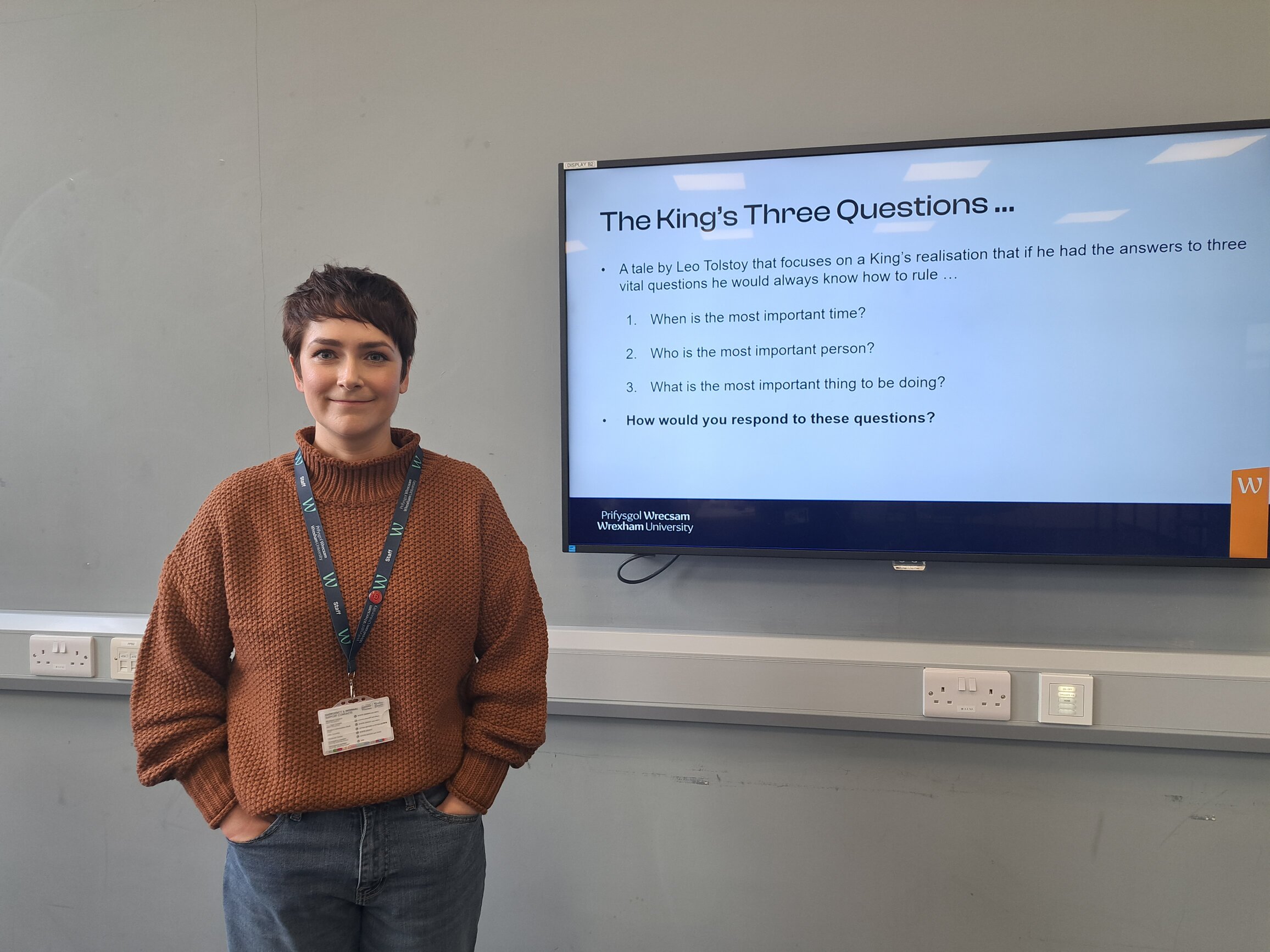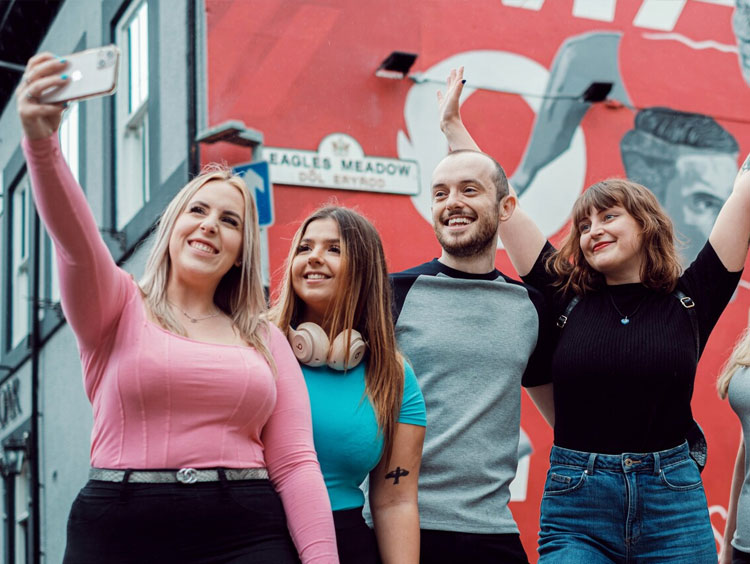Cyfiawnder: Research Seminar Series Seminar #4, Alex Drury
From Practitioner to Researcher – A Perspective from Youth Work
In March, Youth Worker-turned-Research Assistant, Alex Drury, presented at the final hybrid Cyfiawnder Research Seminar of this academic year.
Alex began the talk by talking about her Youth Work background where she worked in a variety of environments such as outreach, supported housing, adventure playgrounds, youth clubs and community development. Alex tends to approach the world with the view that support should be open access, involve the community, start with unconditional positive regard to the young people they work with, and involve adults in the whole process.
Alex has a wealth of experience within Youth Work before coming to Wrexham University. Alex spoke of some difficult experiences, but also some wonderful occasions where a small spark led to great outcomes that could be reached with a lot of energy and hard work.
“When it does work, it’s like magic!”
Youth Work is all about relationships; relationships with young people, relationships with the community, and the relationship between both of those groups. It takes time to build trust and encourage the young people and the community to believe in themselves.
Alex then led onto some recent work commissioned by Welsh Government for the Interim Youth Work Board to review the state of Youth Work funding in Wales. Research could make an impact, but the literature that Alex read didn’t seem to link up with the impact and the real world. However, Alex cared about this Welsh Government project, knowing it had the potential to solve a lot of problems in a sector where funding can be very insecure .
The collaborative, multidisciplinary project between Wrexham, Trinity St. David, and Cardiff Met Universities has three phases involving a feasibility study (published online), a full review, and a cost-benefit analysis. Others on the team from Wrexham include Prof. Mandy Robbins from Psychology and Dr Rob Leigh from Business. This study is innovative in that the statistical data does not currently exist for the voluntary sector.
Some aspects of the study are challenging, for example, in Phase 1 there was a low response rate to the questionnaire. However, Alex’s experience in the sector is paramount for bringing in real world knowledge of how the sector works, for example the team has decided to call the focus groups a more user-friendly name, ‘roadshow events’.
Alex ends with some reflections on the project and working collaboratively with the team who have different backgrounds and experiences. Alex said that as a practitioner, it was easy for her to have strong opinions on the subject, which were balanced out by other members of the team. Gathering perspectives from different people has give the issue a voice. Importantly, Alex understands the competing, heavy demands that draw on other academics and is humble for the opportunity to be able to work on this research as a full-time researcher.
If you want to learn more about the project, please email alex.drury@wrexham.ac.uk.
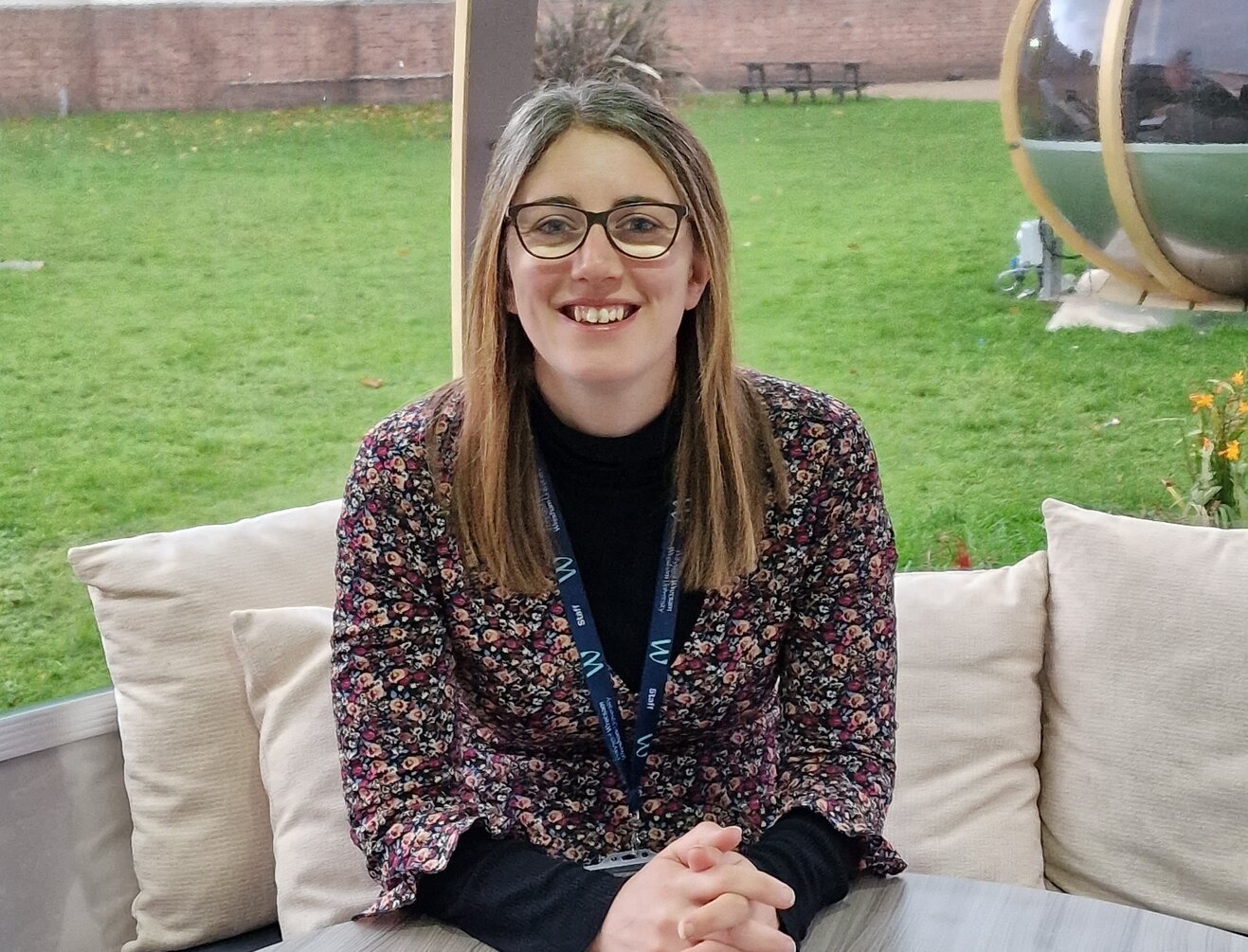
Content Accordions
- Past Seminars
“Played like a deck of cards” – Analysing discourse in Youth Workers’ accounts of ACEs & engaging in Trauma-Informed practice.
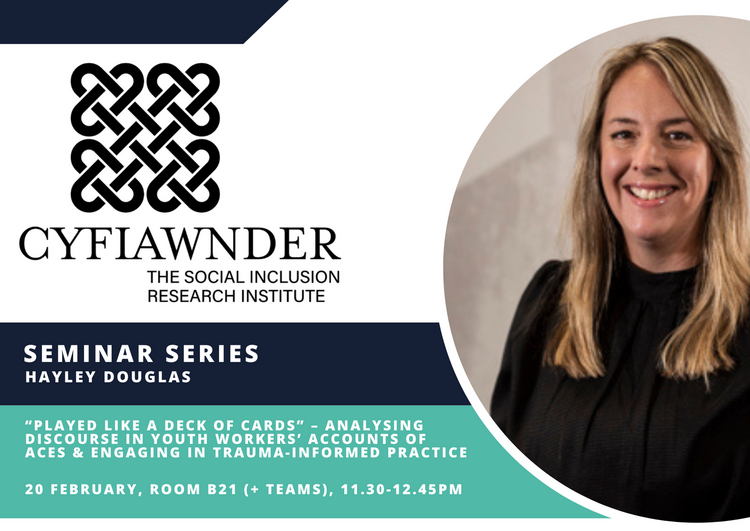
February 2024
For our third Cyfiawnder Research Seminar, Hayley Douglas, Senior Lecturer in Youth and Community Work presented their PhD research on youth workers’ accounts of ACEs (Adverse Childhood Experiences) and engaging in Trauma-Informed practice. This was a momentous occasion for Hayley, who had not previously shared their findings!
Hayley began the session by answering the question: what is youth work? However, this simple question did not have a simple answer. Youth work is a young-people centred-profession involving anti-oppressive practices, but people are often confused about what the role involves. The profession is based on key principles such as voluntary engagement, young people making informed choices about their lives, and the importance of learning with others and through experience. Overall, youth work intends to evoke social and structural change at a broader level. Youth work should be accepting, and youth workers should acknowledge the assets of young people.
The audience was shown a variety of youth work models that are shaped by political, social, and economic contexts. Most of the Western world today employs more positivist thinking, which means that things are measured in numbers (e.g., 29% of the UK have a pet dog), and when we think about problems that people might have, we immediately jump to ‘treating’ these problems. Having someone in a position of power treating you can sometimes feel disempowering, so youth work aims to turn this model around and go from ‘treatment’ to ‘empowerment.’
This explanation was linked to the widespread work on ACEs, which started in the 90s. This initial work found links between negative childhood experiences (such as abuse and neglect) and adult poor health and disease. It was an epidemiological study, focused on public health and provided a snapshot of a correlational link, meaning that the researchers did not test for a causal link. For example, there is research to show a strong correlational link between death by tangled bedsheets and cheese consumption. A link has been identified, but it’s likely they have nothing to do with each other and it’s pure coincidence.
Subsequently, Hayley presented critical viewpoints on measuring ACEs with a small set of questions that are sometimes used to predict whether a young person will grow up to have poorer outcomes in life. The original research was not meant to be applied to individuals and was always situated within the school of public health, looking at population-level data.
Next, Hayley explained the methodology of discourse analysis and language. How language has the power to construct the world. How there are unwritten rules of language. How language relies on its context to decipher meaning. Hayley said that discourse analysis makes the familiar ‘strange,’ and that all discourse analysis should be political.
Hayley interviewed and conducted focus groups with youth workers about ACEs and engaging in trauma-informed practices, and then conducted discourse analysis on the transcripts from the interviews. Despite Youth workers reporting that they felt the ACEs is unhelpful and doesn’t provide tangible real-world impacts to young people in the present, when discourse analysis was applied it demonstrated a different picture. Instead of looking at what was said, and looking at how the language was used, this showed that Youth Workers use the language of ACEs (medical language, which individualises issues of poverty) to create their professional identity and explain what youth work is to others.
Showing one example of an extract from one youth worker’s interview, Hayley pointed out the different words in the passage that reflected different meanings, or discourses. For example, the word ‘helping’ suggests that the youth worker was positioning themselves in a service role, assuming young people require betterment. This contrasts with the original values of youth work.
Hayley ended with summarising how youth workers are in the unfortunate position of having to go against their ideals and ‘tick boxes’ to secure funding to continue their excellent work. This was said to create a danger of reinforcing the inequality youth workers seek to challenge.
If you’re interested in hearing more or working with Hayley, please email Hayley.douglas@wrexham.ac.uk.
A literature review and evaluation of national care models and frameworks providing care for children and young people with learning disabilities in Wales
January 2024
The second Cyfiawnder: Social Inclusion Research Institute seminar was delivered by Dr Dawn Jones in January. Dawn provided a fascinating overview of the status of the health and social care literature surrounding models and frameworks of care for children and young people with learning disabilities.
Background
Dawn was funded by Improvement Cymru to undertake this secondary data analysis looking at and evaluating services of health and social care in Wales. A previous Public Health Wales scoping review had indicated that there were problems with implementation of care models, with a lack of fit between what was meant to be delivered and what was delivered to families.
It was found that there were some pockets of excellence around Wales, where best practice was implemented and families were receiving good care and services, but there was also evidence of poor practice. Existing policies prescribe integration from various services in the health and care sectors to deliver a seamless, holistic service to families enshrined in co-production principles. However, care was often fragmented for many families, or there was a lack of care models to begin with.
Method
Dawn was tasked with writing a literature review to provide a thorough evidence base to build on with primary research in the future. The difference with this review was that Dawn adopted a critical realist framework, which means that instead of providing statistics and percentages, Dawn was immersed in the literature, interpreting and evaluating it instead of simply summarising. Dawn explored what was going right or wrong in the sector, identifying any solution-focused strategies that worked, but also looking at the grey literature and grassroots testimonies and anecdotes in the form of films and blogs.
Findings
Design and Delivery of Integrated Services Models
- All services had a broad commitment to integrative, rights-based, and person-centred frameworks
- There are problems with implementation
- The vision is lost somewhere along the way
- Multi-agency meetings are not attended by both agencies and there is sometimes antagonism between attendees, which can lead to delayed care and confusion over financial decisions
- Having a named accessible professional who can coordinate for families and has knowledge across sectors is helpful
- In some local authorities, health and social care services have different ways of working, for example; the age a child or young person would transfer to adult services may be 16 in one county, but 25 in another
- Health and social care sectors may also work to different ages of transfer to adult services, resulting in service-provision that can be complex to manage for both families and professionals
Skills and Knowledge Bases across Teams in Health and Social Care
- Sectors have different thinking about needs across health and social care, e.g., reasonable adjustment are interpreted as accessibility to the physical environment by health professionals, but reflect deeper social needs by social care sectors
- There is often reluctance to be open and discuss difference perceptions or models
- Named key workers are a key factor to facilitate good outcomes
Authentic Engagement with Co-production
- Finding out consistently what the individuals’ ongoing needs are
- There is a lack of meaningful engagement
- Co-production should be routine rather than one-time events
- There is a need for more accessible mechanisms to support ongoing communication of needs, e.g., those with more complex needs are overlooked and excluded.
Data Collection
- Data collected is fragmented
- Discrepancies between how health and social care sectors define learning disability and how they measure learning disabilities; different sectors are measuring different concepts with no coordination
- Those with learning disabilities say data should be collected more regularly rather than a feedback sheet after attending a one-off event
Summary
Dawn concluded by saying that everyone involved in health and social care want things to work for the families and children with learning disabilities, and they want carers and families to be involved in care delivery and decisions; the vision is shared, but there are different perspectives on how best to reach the desired outcomes.
The take home message is that all services should be considering ‘rights and not services,’ being person-centred from the start and maintaining this perspective. It was also suggested that parents and carers could train the professionals and offer their valuable perspectives.
Next, Dawn hopes to talk to families and children to gather opinions and perspectives and how they are experiencing health and care services. If you are interested in the research, please contact dawn.jones@wrexham.ac.uk.
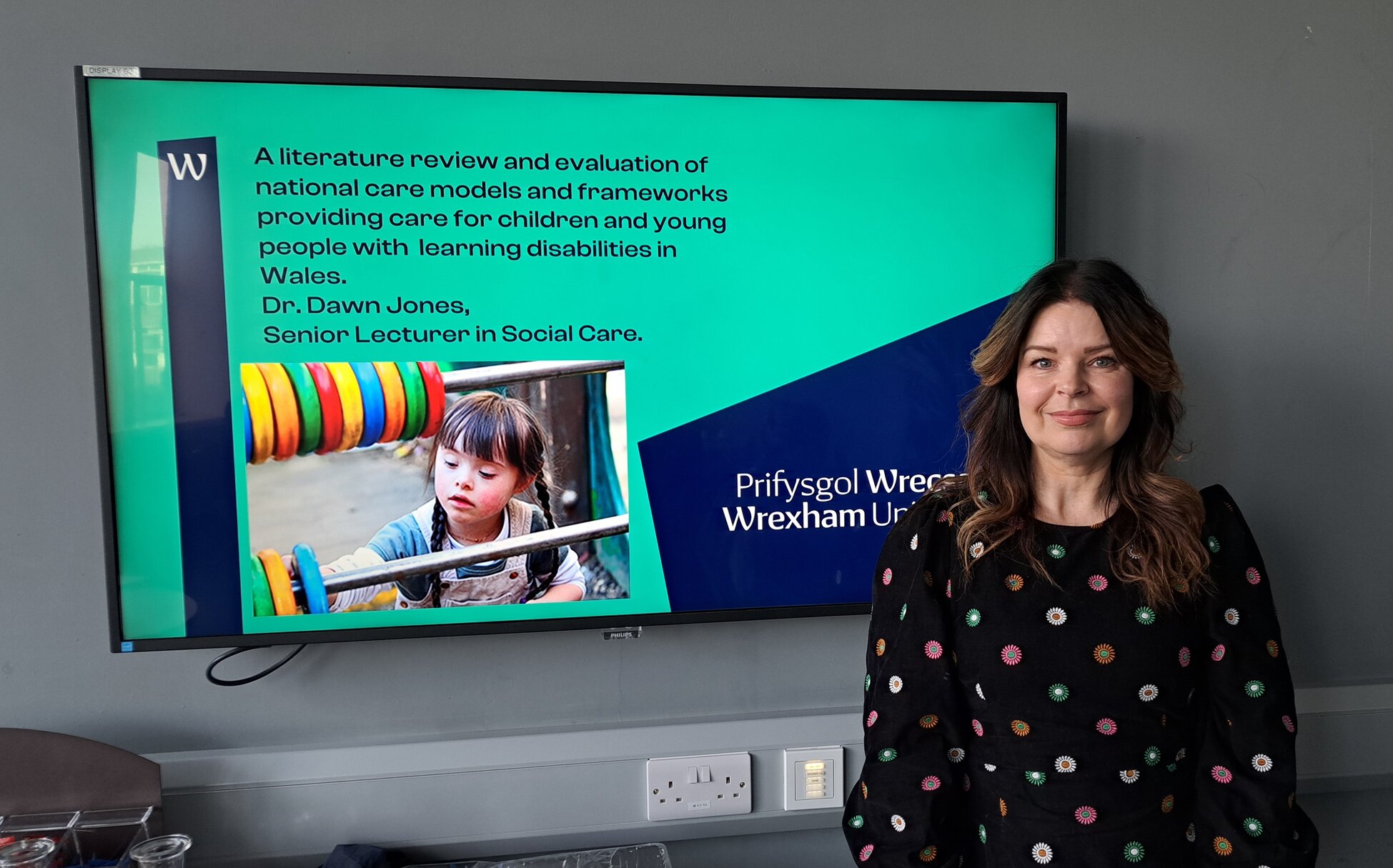
Empowered Compassionate Practice
November 2023
In November, Dr Sharon Wheeler gave us some fascinating insights into the world of compassion. Sharon’s title was “Empowered Compassionate Practice” and the session was chaired by Dr Caroline Hughes, who introduced Sharon and took questions at the end.
Sharon opened with three important questions from a short story by Leo Tolstoy:
- When is the most important time?
- Who is the most important person?
- What is the most important thing to be doing?
The audience guessed two out of three correctly, with the answers being the most important time is now, the most important person is the person you are with, and the most important thing to be doing is caring.
Sharon presented research on workplace wellbeing in the health and care sector, showing stark statistics that over 46% of respondents felt unwell as a result of work stress. Staff, particularly in the NHS, often witness extreme trauma and the emotional labour required is often taken for granted. Three persuasive arguments to invest in health and wellbeing is a moral duty, for recruitment and retention, and also financial return.
So what is compassion? Compassion is an awareness of suffering of self and others, coupled with a desire to relieve it.
Sharon proceeds to talk about compassion fatigue within compassionate care and how there is limited clinical evidence or case studies describing how it is even operationalised. There also seems to be a gap between cognitive compassion and compassionate behaviour, whereby the understanding of compassion exists but it is not put into practice.
Sharon was to clear to differentiate compassion and empathy, suggesting that empathy leads to distress in the one feeling empathy for another, whereas compassion can overcome this negatively by framing situations positively.
Next, Sharon outlines their own research project of conducting 20 interviews with social prescribers, who are often healthcare professionals working outside the NHS. From the results, Sharon created an in-depth logic model, which allows the reader to understand the differences between empathy and compassion, as well as self-compassion.
We can’t wait for the full logic model to be published as an academic article that is bound to create impactful change.
Thank you, Sharon, for a wonderful start to the Cyfiawnder Research Seminar Series. Next up, we have Dr Dawn Jones who will outline their work of evaluating national care models and frameworks providing care for children and young people with learning disabilities in Wales on 9 January, 2024.
